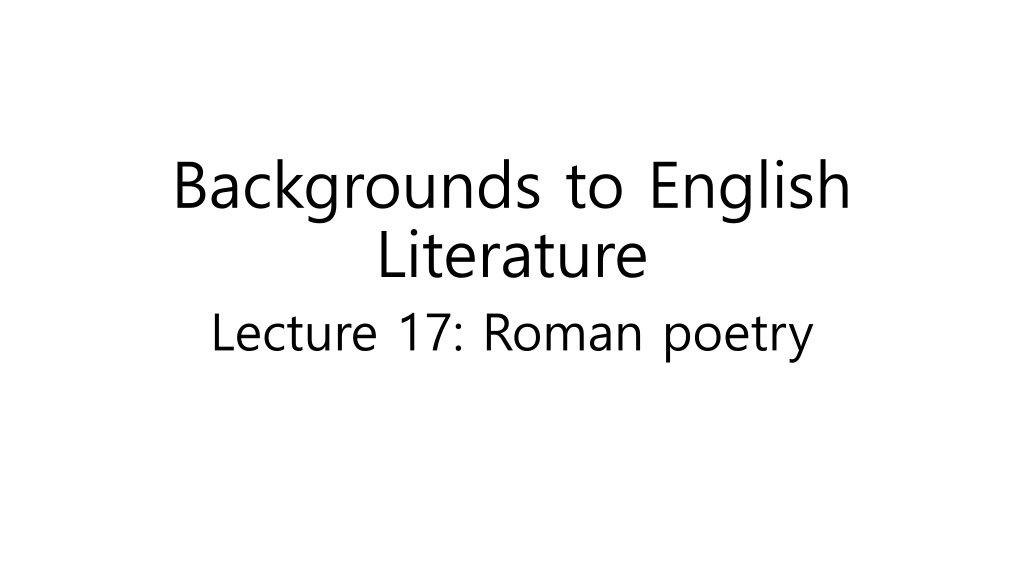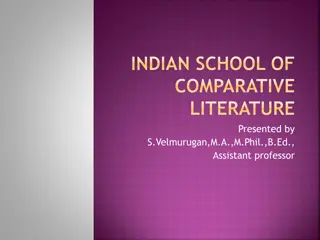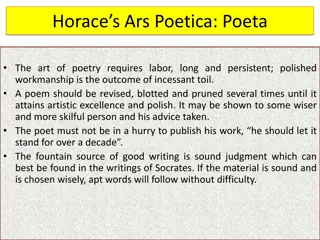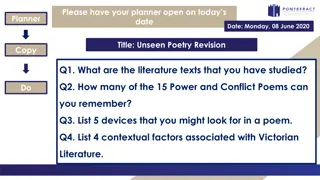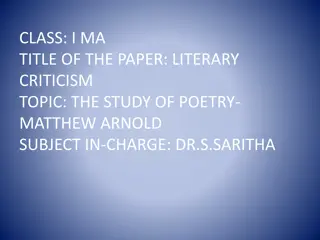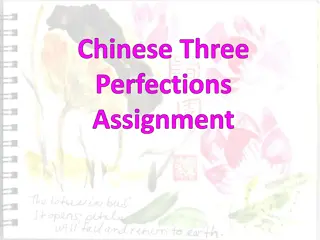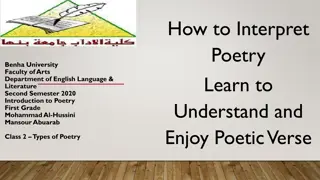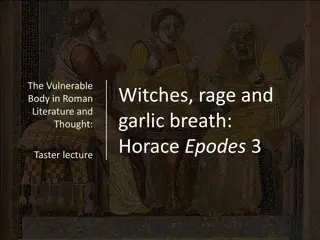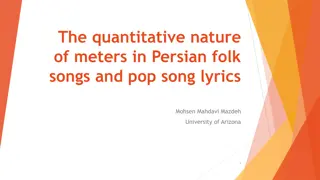Overview of Roman Poetry and The Eclogues: A Study in Roman Literature
Roman poetry encompassed various genres such as epic, drama, lyric, satire, and pastoral, with poets like Virgil and Catullus making significant contributions. The neoteric poets, inspired by Hellenistic traditions, added a new dimension to Roman poetry. The Eclogues by Virgil, drawing from Theocritus' pastoral poetry, idealized rural life and influenced English literature through works like Edmund Spenser's Shepherd's Calendar and Shakespeare's As You Like It.
Download Presentation

Please find below an Image/Link to download the presentation.
The content on the website is provided AS IS for your information and personal use only. It may not be sold, licensed, or shared on other websites without obtaining consent from the author. Download presentation by click this link. If you encounter any issues during the download, it is possible that the publisher has removed the file from their server.
E N D
Presentation Transcript
Backgrounds to English Literature Lecture 17: Roman poetry
=General overview of Roman poetry -Poetry flourished throughout the ancient Roman world. -Literature in verse form had a very high profile within the wider cultural ambience of ancient Rome -Epic: the best known genre of Roman poetry -Second in honour is drama (always in verse) -Many other genres of Roman poetry with diverse aims and styles: lyric, satire, invective, elegy, didactic, pastoral, iambic, the verse epistle, panegyric, and all manner of occasional poetry (from the highly literary to crude graffiti) =Neoteric -A group of the poets who sought to emulate the erudite poetic traditions of the Hellenistic Greek scholar-poets during the lively and troubled later years of the Republic
-Characteristics: a literature of self-expression, didactic, a light poetry of entertainment, the aesthetic attitude later known as art for art s sake. -Cicero makes several references to new poets in relation to these poets, so they were called new poets (neoteroi) -Catullus -Lucretius Virgil
=The Eclogues -Pastoral as a genre 1. The originator: the Greek poet Theocritus, who in the third century B.C. wrote poems representing the life of Sicilian shepherds (Pastor is Latin for shepherd) 2. Virgil imitated Theocritus in his Eclogues, and in doing so established the enduring model for the traditional pastoral. Without the Eclogues pastoral might never have become one of the major, exemplary genres of European poetry. 3. Pastoral: a deliberately conventional poem expressing an urban poet s nostalgic image of the peace and simplicity of the life of shepherds and other rural folk in an idealized natural setting. 4. Influence on the English Literature: Edmund Spenser s Shepherd s Calendar (1579), Sir Philip Sidney s Arcadia (1581-84), Christopher Marlowe s The Passionate Shepherd to His Love, Shakespeare s As You Like It, Alexander Pope s Pastorals (1709)
-Idealization of the place 1. Arcadia: a mountainous region of Greece which Virgil substituted for Theocritus s Sicily as his idealized pastoral milieu. 2. The poems may be praised for articulating a desire for simplicity 3. The conventions: a shepherd reclining under a spreading beech tree and meditating the rural muse, or piping as though he would ne er grow old, or engaging in a friendly singing contest, or expressing his good or bad fortune in a love affair, or grieving over the death of a fellow shepherd. 4. Eclogue I: The Dialogue of Meliboeus and Tityrus 4.1. Meliboeus describes the idleness of Tityrus: Tityrus, lying there, under the spreading beech-tree cover, you study the woodland Muse, on slender shepherd s pipe. . . idling in the shade, teach the woods to echo lovely Amaryllis .
4.2. Tityruss invitation: Yet you might have rested here with me tonight on green leaves: we have ripe apples, soft chestnuts, and a wealth of firm cheeses: and now the distant cottage roofs show smoke and longer shadows fall from the high hills. 5. Eclogue VIII: Damon and Alphesiboeus Compete 5.1. Damon s song: lamenting on his childhood love and showing a more mature view of love s pains Now I know what Love is. He was born on Tmarus s hard stone, or Rhodope s or furthest Garamentes s, not of our race and blood. Cruel Love taught Medea to stain a mother s hands in her children s blood
5.2. mythologically the creator of pastoral poetry and creating magic that will bring restore the lover s affections Bring water and wreathe these altars with soft wool and burn masculine incense and rich herbs, so that I might try to change my lover s cold feelings with magic rites: nothing is lacking here but song. Songs can even draw down the moon from the sky, Circe changed Ulysses s men with magic songs, the cold snake in the field is burst apart by singing. 4.3. In Damon s song, poetry Alphesiboeus s song, the life-giving force. Alphesiboeus s song: mourning for the lost Daphnis, is a transformative force; in
-Criticism against the evils of the city 1. It constitutes a protest, sometimes overt, more often implied, against the evils of the city, even an implicit pacifism. 2. Tityrus s criticizes the city of Rome: Meliboeus, foolishly, I thought the City they call Rome was like ours, to which we shepherds are often accustomed to drive the tender young lambs of our flocks. But this city indeed has lifted her head as high among others, as cypress trees are accustomed to do among the weeping willows. there was never a hope of freedom, or thought of saving. My hand never came home filled with coins, though many a victim left my sheepfolds, and many a rich cheese was pressed for the ungrateful town.
-Criticism against the vision of pastoral poetry 1. It may posit a simplistic, unhistorical relationship between the ruling, landowning class and the workers on the land. 2. It may conceal the realities and oppressions of rural life, in a way that serves the interests of the ruling class. 3. Its function is to mystify and to obscure the harshness of actual social and economic organization. =The Georgics -General overview 1. The best poem by the best poet , Dryden 2. One of the most fundamentally intractable works of ancient literature. 3. Subjects: this poem addresses the great abstracts (knowledge, history, power, psychology, ethics, art, death) in the way our lives do.
4. Diversity of interpretations: this poem does not really tell us about farming but about ourselves and our world: didacticism about agriculture proves metaphor for didacticism about man. -Book IV: Bee-Keeping 1. Summary of Book IV (Introduction; The Nature and Qualities of Bees; Gathering The Honey; Disease in Bees; Aristaeus And His Mother Cyrene; The Capture of Proteus; Orpheus and Eurydice; Aristaeus Sacrifices to Orpheus) 2. Two narratives interweave their threads: the story of Aristaeus and the inserted story of Orpheus and Eurydice. -The story of Aristaeus 1. Aristaeus: 1.1. The fullest account of Aristaeus s myths is found in the Bibliotheca of Diodorus Siculus.
1.2. Aristaeus was the son of Apollo and the nymph Cyrene. 1.3. Demigod who tended crops, sheep and bees and helped country folk when they called on him in need. 1.4. Virgil made significant changes about Aristaeus. He made Aristaeus an immature hero, still on his way to godhead. His Aristaeus might almost be the boy who would grow to adolescence, with much still to learn. 1.5. Although no crime had apparently been associated with Aristaeus before, Virgil would make him guilty of one and have him atone for it. 2. The death of the bees 2.1. Bees in the ancient world were associated with chastity. They were thought to require exemplary purity in their keeper and to be especially repelled by illicit sexuality. 2.2. His bees have been killed off because of his lustful desires 2.3. Until he repents of his offense, Aristaeus is not fit to care for the little civilization he tends, let alone to continue on his way to godhead
3. Fear, not pity: Aristaeus realizes now that it was he who began all this sorrow for Orpheus. He is first moved, not to pity, but to fear (timentem, line 530), even though Proteus had told him that fate was protecting him from further harm. He is ready to learn and grow 4. Bougonia: Cyrene gives her son full instructions on the sacrifice, of four bulls and as many heifers, that he must perform. He follows the ritual dutifully and, on the ninth day, after a further sacrifice in atonement to the dead spirit of Orpheus, a marvelous thing happens: At that moment people saw a sudden portent, marvelous to tell of-- out of the burnt bellies, through the molten flesh and the broken ribs of the oxen, bees were buzzing and swarming. -The story of Orpheus and Eurydice 1. Orpheus 1.1. In general, he was pre-eminently a singer of songs and a player of the lyre
1.2. Writers adorned the story of Orpheus with fantastic miracles, and he came to be associated with more than music: access to the secrets of knowledge, introduction of writing and philosophy, of poetry, of agriculture, even of homosexual love. 2. Virgil s new version of the Orpheus myth 2.1. Virgil s Orpheus is no longer successful in bringing Eurydice to the upper world. Breaking a taboo imposed on him by Hades, Virgil s Orpheus looks back on his Eurydice on the return journey to the coasts of light, and loses her. 2.2. The initial death of Eurydice by snake bite 3. Orpheus s failure 3.1. Madness: madness is the cause of human failure in Virgil. when a sudden madness seized the incautious lover, one to be forgiven, if the spirits knew how to forgive: he stopped, and forgetful, alas, on the edge of light, his will conquered, he looked back, now, at his Eurydice.
Then, Eurydice cried, what madness has destroyed my wretched self, and you? 3.2. Political allusion to Octavian: It is that irrational and destructive streak in human nature that Virgil knows all too well and that Octavian must acknowledge in himself and control. 3.3. In that instant, all his effort was wasted : the word labor (effort) seems clearly intended to connect the Orpheus myth with the rest of the Georgics: the farmer can see all his work destroyed by an ambivalent nature, and the poet, whose art can compel trees, rivers, animals, and death itself, can see his labor lost, undone through his own weakness. 3.3. Moment of parting: Eurydice: Farewell, now: I am taken, wrapped round by vast night, / stretching out to you, alas, hands no longer yours. The poet: What could he do? Where could he turn, twice robbed of his wife?
-Interdependence of the two narratives 1. The story of Aristaeus ending in his discovery of bougonia, and the inserted story of Orpheus and Eurydice ending in both of their deaths. 2. Aristaeus sets in motion the events that destroy Orpheus and Eurydice (he attempts to rape her) while Orpheus sets in motion the events that lead to Aristaeus' discovery of bougonia (he destroys Aristaeus' bees). 3. While his new Orpheus was to fail in his attempt to bring Eurydice back from the dead, his new Aristaeus would meet, out of his failure, success in restoring life to nature. 4. Aristaeus s maturing is complete. He is ready to become a god. 5. There is no creation, in Virgil s world, without loss. 6. Aristaeus = Octavian?
=Terms in relation to ecology: -Pastoral 1. Idyll: the title of Theocritus s pastorals 2. Eclogue 3. Bucolic (the Greek word for herdsman): of or relating to shepherds or herdsmen; relating to or typical of rural life -Georgics
Group discussion -Identify one aspect of our contemporary society which you need to criticize. -Then, satirize that aspect from the perspective of either Horace or Juvenal.
